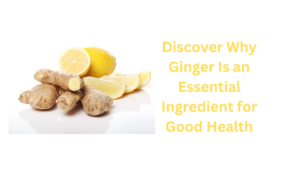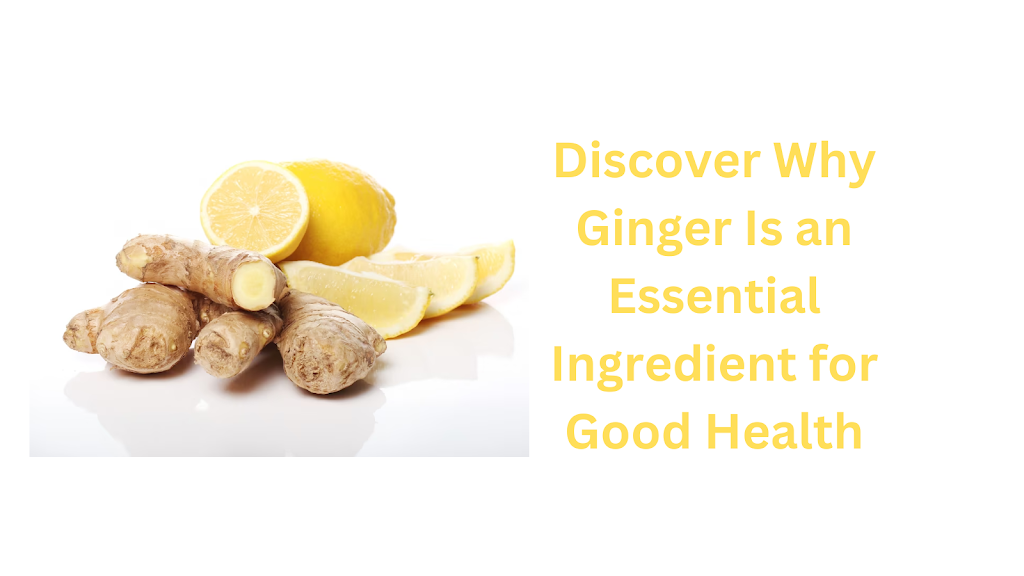Discover Why Ginger Is an Essential Ingredient for Good Health
You know ginger as the spicy root that flavors your favorite stir-fry dish or cocktail. But what you might not know is that ginger has some amazing health benefits, too.
Ginger is a natural anti-inflammatory and antioxidant, and it can help soothe stomach upset, nausea, and morning sickness. It can also help lower blood sugar levels and cholesterol, and has been shown to be effective in treating arthritis and asthma.
Want to learn more? Keep reading for a closer look at the health benefits of ginger.
Introduction to the Health Benefits of Ginger
Around the world, ginger is known for its medicinal properties. It’s been used to help with everything from stomach pains and nausea to colds and flu. And that’s just the beginning—ginger has a host of other health benefits that make it a valuable addition to your diet.
Ginger is very versatile, and you can enjoy it in many different ways. It can be grated and added to stir-fries, juiced and added to smoothies, or brewed as a tea. You can also find it in capsule or tablet form if you don’t like the taste.
So why should you start adding ginger to your diet? Here are just a few of the health benefits it offers:
-
Ginger can help relieve nausea and vomiting.
-
It’s a natural anti-inflammatory, which makes it useful for treating conditions such as arthritis and asthma.
-
Ginger can help reduce congestion and inflammation in the throat.
-
It’s a great source of antioxidants, which can help protect against cell damage and aging.
-
Ginger has been shown to be effective in treating stomach ulcers.
The Evidence-Based Benefits of Ginger
You’ve probably heard about the health benefits of ginger before, but do you know why it’s such an essential ingredient?
 |
| Discover Why Ginger Is an Essential Ingredient for Good Health |
Ginger is a potent superfood that has been used for centuries in traditional medicine. It’s packed with antioxidants, vitamins and minerals, and has a wealth of evidence-based benefits for your health. Here are just a few:
Ginger can help to ease nausea and vomiting, especially during pregnancy or after surgery.
It’s great for digestion, and can help relieve symptoms of gas, bloating and constipation.
Ginger can also help to lower blood sugar levels and control cholesterol levels.
Plus, it has anti-inflammatory properties that can help to relieve pain and swelling.
Simply put, ginger is one of the healthiest ingredients you can include in your diet. So next time you’re feeling a little under the weather, or need a little extra support for your health, reach for some ginger!
How to Use and Prepare Ginger
Ginger is one of those ingredients that has a seemingly endless amount of health benefits. From easing nausea and indigestion to fighting inflammation and even helping with weight loss, ginger is a powerhouse of a spice.
And, thankfully, it’s also incredibly easy to use. You can add fresh ginger to your smoothies, juices, soups or curries. If you’re not a fan of the taste or texture of fresh ginger, you can also find it in powder or capsule form.
When using fresh ginger, be sure to peel and chop it before adding it to your dish. If you’re using powdered ginger, start with a small amount and add more as needed. As with all things, moderation is key when it comes to ginger. Too much can have the opposite effect and cause stomach upset.
Possible Side Effects and Interactions
Although ginger is generally considered safe, it’s important to keep in mind that there may be potential side effects or interactions. If you have a medical condition, it’s best to check with your doctor before adding ginger to your diet.
Ginger may interact with certain medications, including some blood thinners and diabetes medications. It may also cause gastrointestinal side effects, including heartburn and diarrhea, so it’s best to drink it in moderation if you experience these symptoms. Finally, ginger can act as a diuretic, so if you’re taking medications that are known to act as diuretics (such as water pills), you should avoid taking ginger at the same time.
However, even with the possible side effects and interactions in mind, most experts agree that moderate consumption of ginger is safe for most adults. That said, if you are pregnant or nursing, it’s best to limit consumption of ginger or speak with your healthcare provider before incorporating it into your diet.
Conclusion
Bottom line, adding ginger to your diet is a great way to improve your health, and there are many different ways to do so. From adding it to your favorite dish or drink, to taking it in supplement form, there’s a way for everyone to enjoy the benefits of ginger. Be sure to add it to your routine and see for yourself how great you feel!
